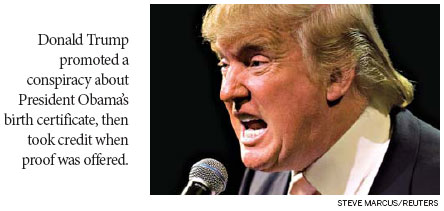View
No matter the proof, conspiracies prevail
Updated: 2011-05-08 07:49
By Kate Zernike (New York Times)

No sooner had President Obama released his long-form birth certificate than Orly Taitz, leader of the movement that doubts President Obama was born in the United States, found reason to doubt it.
"A step in the right direction," she said, even though it was precisely the document that many "birthers" had been demanding. And then she argued that it was still subject to authentication. Donald Trump, bouffant, blond and politically inclined, likewise breezed past the evidence, pausing to take credit for forcing the release of the document before suggesting that Mr. Obama was hiding something else - bad grades in college.
To many, those who doubt Mr. Obama's citizenship are driven simply by racial prejudice; they are unwilling to allow that America's first black president could hold the office legitimately.
Many scholars of conspiracy theory agree. But they also note that such theories are hardly unique to Mr. Obama; they have a long history in the United States and elsewhere, coming from left and right, covering all sorts of subjects, political and otherworldly (the twin towers were not hit by airplanes). And those who doubt Mr. Obama's citizenship fit the mold of other conspiracy theorists: they don't loose their grip on their beliefs easily, if at all.
"It almost becomes an article of faith, and as with any theological belief, you can't confront it with facts," said Kenneth D. Kitts, a professor of political science at the University of North Carolina who has written extensively about presidential commissions that looked into events that have generated some of the biggest conspiracy theories of the last century - the attack on Pearl Harbor and the assassination of John F. Kennedy, among others.
The fact that many Americans have told pollsters that they doubt the president's citizenship is less surprising when you consider the sizable percentages of Americans who subscribe to other conspiracy theories, said Robert Alan Goldberg, a history professor at the University of Utah and the author of "Enemies Within: The Culture of Conspiracy in Modern America."
Eighty percent of Americans, he said, believe that President Kennedy was killed by a conspiracy, rather than a lone gunman, as a government commission affirmed. Thirty percent believe that the government covered up aliens' landing in Roswell, New Mexico. September 11, of course, has inspired conspiracy theories - it was plotted, variously, by "the Jews," or the Bush administration.
By definition, Professor Goldberg said, a conspiracy theory is a belief that cunning forces are seeking to bend history to their will, provoking terror attacks or economic calamity to move the world in the direction they wish.
"I look at this birther conspiracy as a typical example," he said. "This is far beyond the issue of whether this is a legitimate president. The real issue for them is this belief that this is a ploy by this hidden group to get power, to move Americans toward socialism or globalism or multiculturalism using Barack Obama as a pawn."
The Alfred Dreyfus affair is a concise example of the damned-if-you-do, damned-if-you-don't nature of conspiracy theories. Mr. Dreyfus, a young Jewish artilleryman, was wrongly imprisoned in France in 1894 on accusations of treason. Officers argued that his handwriting appeared on incriminating documents, writes Louis Begley in a book on the subject. When one expert doubted the handwritings' similarity, the government produced another to argue that dissimilarity was proof of his guilt - Dreyfus had altered his writing to throw people off his trail.
Professor Goldberg writes in an encyclopedia, "Conspiracy Theories in American History": "Conspiracy theory draws power by merging with and reinforcing traditional American values and beliefs: a sense of mission, Protestant supremacy, concerns about encroachments on liberty, anti-elitism, maintenance of the racial order, and the sanctity of private property."
In this analysis, it's not surprising that the first black president, educated in the Ivy League, would become the subject of a conspiracy theory. Many conspiracy theorists believe not only that the president lied about his birthplace and religion, they will also argue that the president is going to take away guns and put them in re-education camps.
Still, even those who study conspiracy theories are surprised by the intensity of the one surrounding the Obama birth certificate. Kathryn Olmsted, a history professor at the University of California notes that conspiracy theorists claimed that President Dwight Eisenhower, a Republican and a staunch cold warrior, was actually a secret communist. But the attacks on Mr. Obama, she argued, are about race. And because these theorists are fueled by partisan hatred, many won't be satisfied. "They'll always question the authenticity of the documents they're given," she said, "because they're not driven by a quest for truth."
The New York Times
Specials

2011 Sino-US Dialogue
China and the United States will hold the third round of the Strategic and Economic Dialogue from May 9-10 in Washington.

Bin Laden dead
The world's most wanted man was killed in a US raid in Pakistan.

US-style sports camp
The US sports camp company, Camp Woodward, will open its first residential camp in Beijing in June.